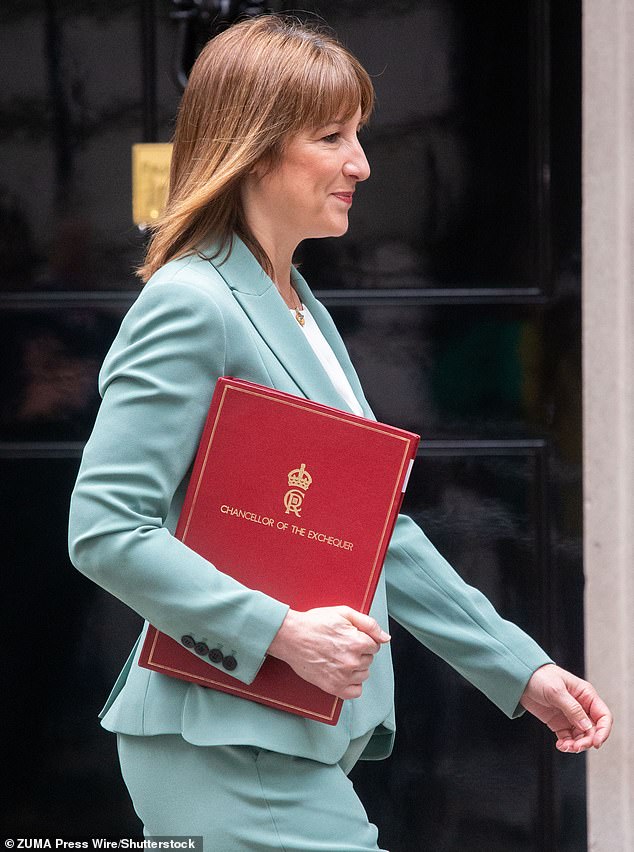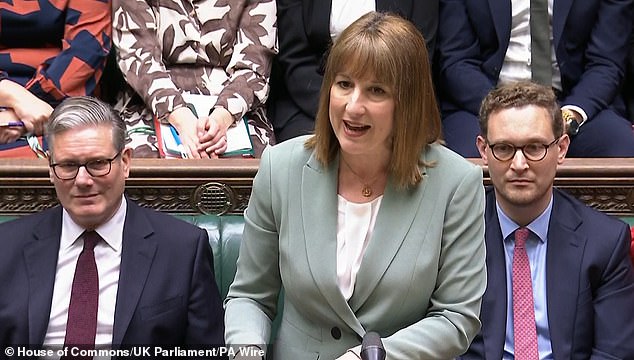Our first job was to stabilise the economy and public finances,’ Keir Starmer tweeted yesterday morning, a few hours before Chancellor Rachel Reeves delivered Labour’s spending plans for the rest of the decade.
‘Now, we move into a new chapter . . . we’re investing in Britain’s renewal.’
The implication was clear: Labour had fixed the foundations of the economy (indeed the PM used these very words in an earlier tweet). Things were now improving. So it was time to dish out the dosh. As a piece of delusional drivel it is in a class of its own, even for a government which has become a stranger to the truth.
Since Reeves’ first budget last October, the Bank of England has downgraded its economic growth forecast for this year from 1.5 per cent to 0.7 per cent and the Office for Budget Responsibility (the official independent forecaster) cut its growth estimate in half, from 2 per cent to 1 per cent.
In April, inflation jumped back up, this time to 3.5 per cent (way above the 2 per cent target). In May, manufacturing suffered the sharpest drop in new orders in 19 months.
Early HMRC estimates indicated that the number of pay-rolled employees in the UK was down 274,000 on May 2024. Unemployment is up 10 per cent since Labour took over.
So much for ‘fixing the foundations’, unless you’re talking about the foundations of the graveyard.
‘We can’t tax and spend our way to higher living standards and better public services,’ averred Reeves in her Spring Statement. Yet less than three months later that is exactly what she is attempting, precisely because a far-from-fixed, sclerotic economy is failing to generate enough revenue to assuage Labour’s insatiable appetite for more public spending on pretty much everything.

Since Reeves’ first Budget last October, the Bank of England has downgraded its economic growth forecast for this year from 1.5 per cent to 0.7 per cent, writes Andrew Neil
Reeves’ big tax rises last October will pay for some of the extra spending. But the bulk of her Madame Bountiful act is being financed by extra borrowing on a massive scale – to an extent few outside financial circles appreciate.
At the time of the last Tory Budget in March 2024, the OBR forecast that annual budget deficits would accumulate to £323 billion in extra borrowing between the financial years 2024-25 and 2028-29, all of which would be added to an already ballooning national debt.
But by March of this year, with Reeves’ tax and spending plans clearer, the OBR increased its estimate of borrowing over five years to £524 billion — adding an extra £200 billion to the national debt (which is already £2.8 trillion, almost 100 per cent of our GDP).
In reality, that is almost certainly an underestimate. Back in March 2024, the OBR forecast the budget deficit would be £87 billion in the financial year 2024-25, which ended last April.
In fact, in turned out to be almost double, at £152 billion. The OBR has a habit of underestimating deficits.
Its growth forecasts for next year and beyond involve some pretty heroic assumptions about productivity and investment which are unlikely to be realised. We could be looking at an extra £250 billion in debt, rather than £200 billion, under Chancellor Reeves.
The folly underlying yesterday’s debt-fuelled spending review is that Reeves has embarked on a borrowing binge just when the global debt markets, which lend to governments, are coming down hard on profligate state spending. The USA and Japan have already had their knuckles rapped. Now the UK is in their crosshairs – and we are already paying the price.
Even before yesterday’s announcements, it cost Britain more to borrow over 10 or 30 years – the sort of long-term debt to pay for the capital investment that Reeves so proudly announced yesterday – than any other major market economy.

It is already costing us more to borrow than when Liz Truss was, in Labour’s oft-repeated words, ‘crashing the economy’. And now Reeves will pile into the bond markets to borrow even more, Neil says
Indeed, the yield (in effect, annual interest) on 10 and 30-year gilts (as UK government bonds are called) is now higher, at 4.65 per cent and 5.25 per cent respectively, than during the infamous ‘ClusterTruss’ of 2022.
That’s right. It is already costing us more to borrow than when Liz Truss was, in Labour’s oft-repeated words, ‘crashing the economy’. And now Reeves will pile into the bond markets to borrow even more.
The national debt is already costing us more than £100 billion a year in interest payments – almost double what we have been spending on defence.
That will rise as more debt is issued and existing debt is refinanced at much higher yields. By the end of the decade the annual cost of servicing the debt is likely to be exceeded only by spending on health, welfare and pensions.
The danger is not that there will be a gilts strike (the bond markets just stop lending to us) but that lenders will start demanding exorbitant yields to cover the growing risk of lending to the UK, making debt-fuelled spending simply uneconomic.
We might not be far away from that, which is why Reeves, having maxed out the UK credit card, will need to turn to more tax rises come her second Budget in October. Whether she could survive that having explicitly ruled out any further major tax rises will be a matter of increasing speculation between now and then.
Despite claims they are ‘cast-iron’, her fiscal rules are already shot to hell: she fiddled the borrowing rule to take on more debt and her ‘fiscal headroom’ has all but disappeared within months of its creation.
There are many on the Left, of course, who still think pumping up state spending is the route to faster growth, especially if it’s investment in infrastructure, such as the Chancellor announced yesterday.
In truth, such spending takes a long time to deliver growth and much of it is wasted or has a marginal impact. I doubt HS2, the UK’s most expensive infrastructure venture ever, is doing much to boost the UK’s GDP.
As always, the NHS gobbled up the lion’s share of extra day-to-day spending in yesterday’s review. And, as always, the usual vested interests moaned that it wasn’t enough. It never is. Yet by 2028-29, the annual budget for health and social care will be £232 billion, far and away the biggest category of state spending.
Even so, internal NHS estimates suggest it will still be some way from hitting its target of carrying out 92 per cent of routine operations within 18 weeks of the patient joining the waiting list.
The more health secretary Wes Streeting talks about reform, the less anything happens.
The NHS is a money pit into which billions are poured but productivity never rises, undermining the overall efficiency of the economy.
When Reeves announced the spending review she promised a line-by-line examination of every pound the government spent.
I very much doubt that ever happened. But if it did, the upshot has been zero. Any savings are imperceptible.
Every single thing government did before the review, it will continue to do after it.
Our spend now, borrow now, tax later Chancellor couldn’t bring herself to cut a single function of our bloated government.
Instead, she has set us on a precarious fiscal path which could blow up in her face. Meanwhile, we tread water as the stagflation nation of de minimis growth and persistent inflation.
But it’s not all gloom and doom.
Before Reeves spoke yesterday it was revealed that, thanks to Labour’s generosity in paying Mauritius to take the Chagos Islands off our hands (a move for which there was no need but which is now costing the Treasury billions), Mauritius is able to pay off its national debt and abolish income tax for four-fifths of its citizens.
It is surely a comfort to know that, if not in our own grey and chilly islands, there is a sunny place somewhere in the Indian Ocean benefiting from Madame Bountiful’s largesse.











